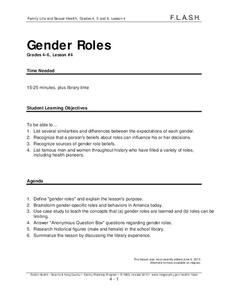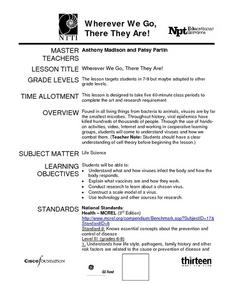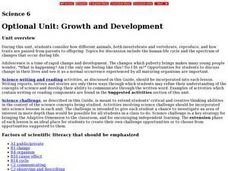Curated OER
Fit To Play?
Young scholars research certain sports-related injuries and who may be at risk for these conditions. They synthesize their knowledge by collectively developing a comprehensive medical history form.
Curated OER
Food For Thought
Students create an individual menu for one of their peers. They must examine their peer's activity level and family history.
Curated OER
Law: Requiring HPV Vaccine
Young scholars research the HPV vaccine and estimate its cost. They interview doctors and local health officials about it. Students write feature stories based on their research focusing on the timelines for implementation in their...
Curated OER
HEALTH AND BEHAVIORAL STUDIES
Learners select a country in South Africa and writes a one-page report on the economic and social issues facing that country, offering suggestions as to how the conditions of poverty and HIV/AIDS.
Seattle & King County Family-Planning Program
Gender Roles
Class members identify gender-specific roles and expectations in American society today by surveying adults, examining modern entertainment, and researching historical figures.
Curated OER
Emergency? Ask A Kid!
What is an actual emergency situation and what should you do to prepare for it? Learners will identify a variety of emergency situations and the appropriate way to address first aid concerns to minimize injuries. They will also discover...
Alabama Department of Archives and History
A Worse Death: War or Flu?
In a lesson that integrates history and mathematics, class members create graphs that compare military death statistics from World War I with those that resulted from the influenza pandemic of 1918.
Curated OER
Wherever We Go, There They Are!
The central video for this lesson is not available through the included resource link. However, the activity that simulates the passing of a virus through a population is impacting and the other resource links are invaluable. Use this...
Cancer Care
What is Breast Cancer?
How gets breast cancer? What are the hereditary risk factors? Can individuals reduce their risk factors? If you are looking for a resource to use during October's in Breast Cancer Awareness Month, check out the lessons in this packet.
Curated OER
Bromine: An Important Arkansas Industry
Arkansas ranks first in the entire world in the production of bromine! Here is a lesson which guides middle schoolers through a study about the formation and history of Arkansas' bromine reserves. They also looks at the many uses of...
Curated OER
Changing Planet: Infectious Diseases Classroom Activity
Here is a different approach: emerging epidemiologists first go home to interview family on the topic of infectious disease. Then they come to class and view a video and PowerPoint that explore how climate change may increase the...
Curated OER
Bittersweet: Diabetes
Ninth graders examine the disease of diabetes. In this diabetes and health lesson students examine the disease, the people who are most at risk for diabetes, as well as how to best prevent diabetes.
Curated OER
Home Healing and Family Stories
Students explore their family history by examining home remedy traditions. They read and discuss a handout about home remedies, conduct an interview with a family member, and complete an interview worksheet.
Curated OER
Problem Solving in Genetic Disorders
A class of older and academically mature students are divided into pairs, usually one male and one female and are told that they are expecting a child. Unfortunately, their child may or may not have inherited some form of genetic...
Alabama Department of Archives and History
Nellie Bly to Dr. Peter Bryce: 19th Century Asylum Reform
What kind of treatment could a patient expect in an asylum during the 1800's? The abusive and neglectful conditions in 19th century asylums are the focus of a lesson that examines the work of reformers Nellie Bly, Dorothea Dix, and...
Curated OER
Food and Culture: Exploring the Flavors of Your Community
Students brainstorm the types of food they eat at home, discussing and comparing with the class. Students brainstorm and make a chart of questions that came out of the activity and their discussions. Students interview someone who...
Curated OER
Simulated Genetic Counseling Session
Students, in groups, prepare a family history for a family with a genetic condition. They simulate a genetic counseling session and listen to a guest lecture by a genetic counselor.
Curated OER
The Great Depression: Eating on a Shoestring
Students explore the realities of feeding a family on a very limited budget by comparing the cost of living in the 1930s to the cost of living today. Using primary documents and technology to make the comparison, they identify the impact...
Curated OER
Let's Make a Meal: A Study of Oats
Students investigate the history and health benefits of oats. In this food history and nutrition lesson, students describe the origin of oats in America, define nutrition related vocabulary, and read and follow recipes for making...
Curated OER
Mobile Phones
Investigate how mobile phones impact their lives through this technology lesson that has students discuss the history of the cell phone and research how cell phones are being used in third world countries. Students create a blog for new...
Curated OER
Dust Busters to the Rescue
Students examine the importance of cleaning up and preventing indoor air pollution. They investigate how cleaning can reduce the harmful health effects of indoor air pollution.
Curated OER
Families and Neighborhoods
Students explore the concept of community. In this community instructional activity, students explore the cultural flavor of their neighborhoods as they discuss the history of their neighborhoods and draw pictures of their family and a...
Curated OER
Growth and Development
Students analyze potentially stressful situations to determine the degree of control and individual has over behaviors. They provide examples of each of the following types of potentially negative thinking such as selective perception,...
Curated OER
Mediation/Conciliation
Twelfth graders discuss the court system in Japan, and assume roles of family members and friends of air crash victims. They discuss whether they would file suit against airlines, compare methods of achieving justice in United States and...

























